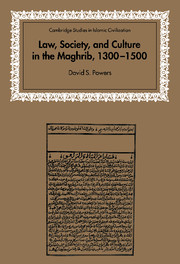Book contents
- Frontmatter
- Contents
- List of figures and tables
- Preface
- Introduction
- 1 Kadijustiz or Qāḍi-Justice? A Paternity Dispute from Fourteenth-Century Morocco
- 2 From Almohadism to Mālikism: The Case of al-Haskūrī, the Mocking Jurist, ca. 712-716/1312–1316
- 3 A Riparian Dispute in the Middle Atlas Mountains, ca. 683-824/1285–1421
- 4 Conflicting Conceptions of Property in Fez, 741–826/1340–1423
- 5 Preserving the Prophet's Honor: Sharīfism, Sufism, and Mālikism in Tlemcen, 843/1439
- 6 On Judicial Style: Two Fatwās on Tawlīj (ca. 880/1475)
- Conclusion: The Muftī
- Bibliography
- Index of Qur'ānic Verses
- Index of Prophetic Ḥadīth
- Index of Names
- Subject index
6 - On Judicial Style: Two Fatwās on Tawlīj (ca. 880/1475)
Published online by Cambridge University Press: 05 July 2014
- Frontmatter
- Contents
- List of figures and tables
- Preface
- Introduction
- 1 Kadijustiz or Qāḍi-Justice? A Paternity Dispute from Fourteenth-Century Morocco
- 2 From Almohadism to Mālikism: The Case of al-Haskūrī, the Mocking Jurist, ca. 712-716/1312–1316
- 3 A Riparian Dispute in the Middle Atlas Mountains, ca. 683-824/1285–1421
- 4 Conflicting Conceptions of Property in Fez, 741–826/1340–1423
- 5 Preserving the Prophet's Honor: Sharīfism, Sufism, and Mālikism in Tlemcen, 843/1439
- 6 On Judicial Style: Two Fatwās on Tawlīj (ca. 880/1475)
- Conclusion: The Muftī
- Bibliography
- Index of Qur'ānic Verses
- Index of Prophetic Ḥadīth
- Index of Names
- Subject index
Summary
It is better for you to leave your heirs rich than to leave them destitute, begging from others. Any expense that you incur, seeking thereby the face of God, will be rewarded – even the morsel of food that you put into your wife's mouth.
(prophetic ḥadīth)Fear God – and treat your children equitably.
(prophetic ḥadīth)In a series of essays published since 1989, Rosen has argued that Islamic law and Moroccan culture are best understood as two interlocking domains and that Muslim judges and jurists employ a mode of judicial reasoning that closely resembles the modes of reasoning found in other domains of Moroccan life. When a qāḍī decides a case, Rosen argues, he seeks to determine the consequences that his judgment will have on the “networks of ties that people possess” by making commonplace assumptions about human nature and the meaning of specific acts. Rosen mentions a Moroccan judge with whom he spoke in 1978 who claimed to be familiār with everyone in the town where he served and thus to be able to distinguish good people from bad on the basis of this knowledge. “All you have to do,” the judge explained to Rosen, “is look at what a person does in order to determine what is in a person's head. If someone is bad it will show up in the way he acts toward other people, and you cannot hide what you do.”
- Type
- Chapter
- Information
- Law, Society and Culture in the Maghrib, 1300–1500 , pp. 206 - 228Publisher: Cambridge University PressPrint publication year: 2002



